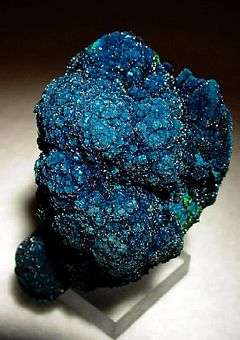Cornetite
| Cornetite | |
|---|---|
|
Cornetite from the type locality, Star of the Congo Mine, Lubumbashi, Haut-Katanga District, Democratic Republic of the Congo. 5.7 × 3.9 × 3.9 cm in size | |
| General | |
| Category | Phosphate minerals |
| Formula (repeating unit) | Cu3PO4(OH)3 |
| Strunz classification | 8.BE.15 |
| Dana classification | 41.03.02.01 |
| Crystal symmetry | Orthorhombic mmm |
| Unit cell | a = 10.845(10) Å, b = 14.045(10) Å, c = 7.081(5) Å; Z = 8 |
| Identification | |
| Formula mass | 336.63 g |
| Color | Dark blue to green-blue |
| Crystal habit | Crystals are short prismatic |
| Crystal system | Orthorhombic |
| Twinning | On {h0l} |
| Cleavage | None observed |
| Mohs scale hardness | 4.5 |
| Luster | Vitreous |
| Diaphaneity | Transparent to translucent |
| Specific gravity | (Measured) 4.10 |
| Optical properties | Biaxial (-) |
| Refractive index | nα = 1.765 nβ = 1.810 nγ = 1.820 |
| Birefringence | δ = 0.055 max |
| Pleochroism | non-pleochroic |
| 2V angle | Measured: 33° , Calculated: 48° |
| Dispersion | none |
| Solubility | cold HCl |
| References | [1][2][3][4] |
Cornetite is a phosphate of copper with hydroxyl named after the geologist Jules Cornet. It was discovered in 1917.
Type Locality
Cornetite is most notably found in the Star of Congo mine, near Lubumbashi.
Environment
Cornetite is a rare secondary mineral in some hydrothermal copper deposits.
Structure
Unlike related phases such as Pseudomalachite, the copper atoms are all five-fold coordinated by oxygen. There are three unique copper sites that are all quite distorted from ideal symmetry. Two are in approximate tetragonal pyramids and the third is essentially a trigonal bipyramidal coordination. Edge sharing polyhedra lead to copper-copper dimer formation, and the overall structure is a three-dimensional network of copper-oxygen polyhedra.[4]
References
| Wikimedia Commons has media related to Cornetite. |
- ↑ http://www.mindat.org/min-1131.html Mindat.org
- ↑ http://webmineral.com/data/Cornetite.shtml
- ↑ http://www.handbookofmineralogy.org/pdfs/cornetite.pdf Handbook of Mineralogy
- 1 2 M. Fehlmann, Subrata Ghose, and J. J. Finney, Direct Determination of the Crystal Structure of Cornetite, Cu3PO4(OH)3, by the Monte Carlo Method J. Chem. Phys. 41, 1910 (1964) http://dx.doi.org/10.1063/1.1726182
This article is issued from Wikipedia - version of the Thursday, November 12, 2015. The text is available under the Creative Commons Attribution/Share Alike but additional terms may apply for the media files.
